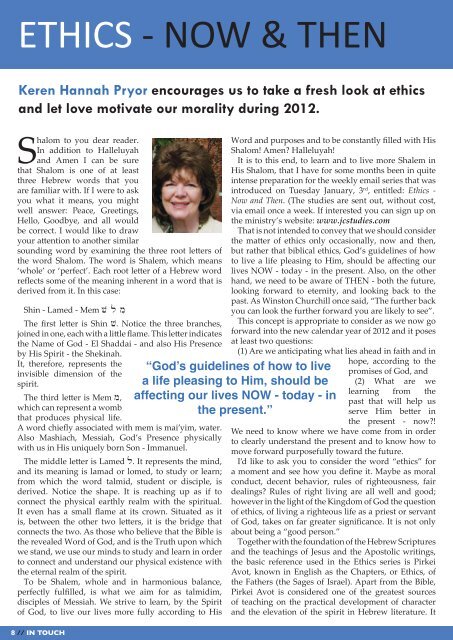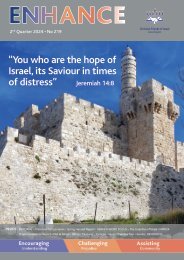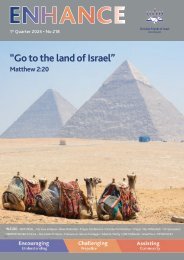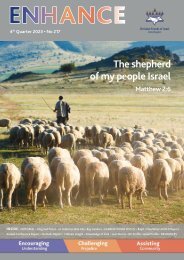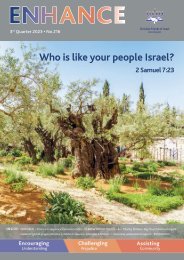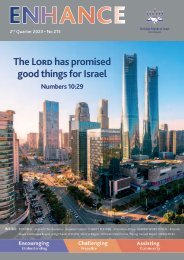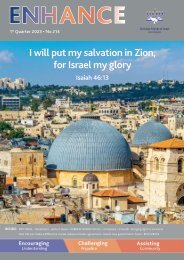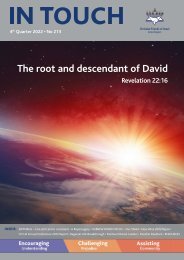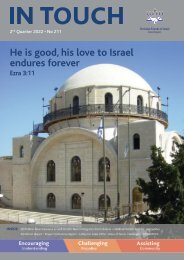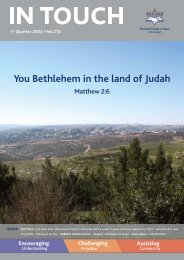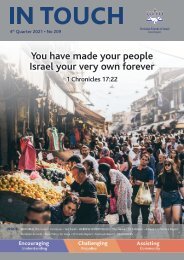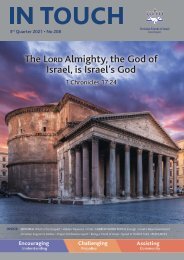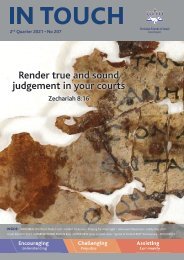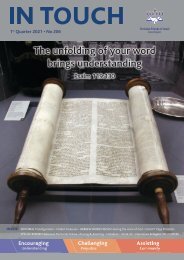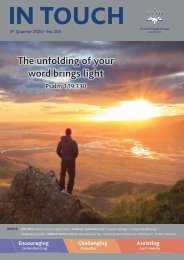In Touch Quarter 1 - 2012
You also want an ePaper? Increase the reach of your titles
YUMPU automatically turns print PDFs into web optimized ePapers that Google loves.
ETHICS - NOW & THEN<br />
Keren Hannah Pryor encourages us to take a fresh look at ethics<br />
and let love motivate our morality during <strong>2012</strong>.<br />
Shalom to you dear reader.<br />
<strong>In</strong> addition to Halleluyah<br />
and Amen I can be sure<br />
that Shalom is one of at least<br />
three Hebrew words that you<br />
are familiar with. If I were to ask<br />
you what it means, you might<br />
well answer: Peace, Greetings,<br />
Hello, Goodbye, and all would<br />
be correct. I would like to draw<br />
your attention to another similar<br />
sounding word by examining the three root letters of<br />
the word Shalom. The word is Shalem, which means<br />
‘whole’ or ‘perfect’. Each root letter of a Hebrew word<br />
reflects some of the meaning inherent in a word that is<br />
derived from it. <strong>In</strong> this case:<br />
Shin - Lamed - Mem v l mi<br />
The first letter is Shin v. Notice the three branches,<br />
joined in one, each with a little flame. This letter indicates<br />
the Name of God - El Shaddai - and also His Presence<br />
by His Spirit - the Shekinah.<br />
It, therefore, represents the<br />
invisible dimension of the<br />
spirit.<br />
The third letter is Mem m,<br />
which can represent a womb<br />
that produces physical life.<br />
A word chiefly associated with mem is mai’yim, water.<br />
Also Mashiach, Messiah, God’s Presence physically<br />
with us in His uniquely born Son - Immanuel.<br />
The middle letter is Lamed l. It represents the mind,<br />
and its meaning is lamad or lomed, to study or learn;<br />
from which the word talmid, student or disciple, is<br />
derived. Notice the shape. It is reaching up as if to<br />
connect the physical earthly realm with the spiritual.<br />
It even has a small flame at its crown. Situated as it<br />
is, between the other two letters, it is the bridge that<br />
connects the two. As those who believe that the Bible is<br />
the revealed Word of God, and is the Truth upon which<br />
we stand, we use our minds to study and learn in order<br />
to connect and understand our physical existence with<br />
the eternal realm of the spirit.<br />
To be Shalem, whole and in harmonious balance,<br />
perfectly fulfilled, is what we aim for as talmidim,<br />
disciples of Messiah. We strive to learn, by the Spirit<br />
of God, to live our lives more fully according to His<br />
Word and purposes and to be constantly filled with His<br />
Shalom! Amen? Halleluyah!<br />
It is to this end, to learn and to live more Shalem in<br />
His Shalom, that I have for some months been in quite<br />
intense preparation for the weekly email series that was<br />
introduced on Tuesday January, 3 rd , entitled: Ethics -<br />
Now and Then. (The studies are sent out, without cost,<br />
via email once a week. If interested you can sign up on<br />
the ministry’s website: www.jcstudies.com<br />
That is not intended to convey that we should consider<br />
the matter of ethics only occasionally, now and then,<br />
but rather that biblical ethics, God’s guidelines of how<br />
to live a life pleasing to Him, should be affecting our<br />
lives NOW - today - in the present. Also, on the other<br />
hand, we need to be aware of THEN - both the future,<br />
looking forward to eternity, and looking back to the<br />
past. As Winston Churchill once said, “The further back<br />
you can look the further forward you are likely to see”.<br />
This concept is appropriate to consider as we now go<br />
forward into the new calendar year of <strong>2012</strong> and it poses<br />
at least two questions:<br />
(1) Are we anticipating what lies ahead in faith and in<br />
hope, according to the<br />
promises of God, and<br />
(2) What are we<br />
learning from the<br />
past that will help us<br />
serve Him better in<br />
the present - now?!<br />
We need to know where we have come from in order<br />
to clearly understand the present and to know how to<br />
move forward purposefully toward the future.<br />
I’d like to ask you to consider the word “ethics” for<br />
a moment and see how you define it. Maybe as moral<br />
conduct, decent behavior, rules of righteousness, fair<br />
dealings? Rules of right living are all well and good;<br />
however in the light of the Kingdom of God the question<br />
of ethics, of living a righteous life as a priest or servant<br />
of God, takes on far greater significance. It is not only<br />
about being a “good person.”<br />
Together with the foundation of the Hebrew Scriptures<br />
and the teachings of Jesus and the Apostolic writings,<br />
the basic reference used in the Ethics series is Pirkei<br />
Avot, known in English as the Chapters, or Ethics, of<br />
the Fathers (the Sages of Israel). Apart from the Bible,<br />
Pirkei Avot is considered one of the greatest sources<br />
of teaching on the practical development of character<br />
and the elevation of the spirit in Hebrew literature. It<br />
“God’s guidelines of how to live<br />
a life pleasing to Him, should be<br />
affecting our lives NOW - today - in<br />
the present.”<br />
8 // IN TOUCH


